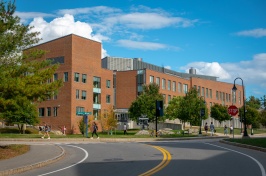UNH Research Finds Decline in Forest Cover in New England and New York
DURHAM, N.H. - Forest cover has declined throughout New England and New York over the last decade, though losses to development slowed slightly during the Great Recession, researchers in the Carsey School of Public Policy at the University of New Hampshire found. The researchers also found forest losses were greatest along the urban fringe, where population growth was highest.
In rural areas forest cover change is primarily a result of commercial timber harvesting and temporary as forests regrow following harvest. However, in urban areas the loss of forests to development is almost always permanent. This ongoing loss of forestland has serious implications for ecosystem services like drinking water filtration, storm abatement and air purification. Although the Great Recession may have slowed the pact of forest loss in some areas, that is likely to resume as the economy recovers. In addition, forest-based industries and recreation create more than $30 billion in economic activity in the region and support more than 100,000 jobs.
"To preserve the benefits that forested landscapes provide to the people and institutions of the region, action is needed to maintain the health, diversity and productivity of these forest," the researchers said. "Careful planning can better balance the decreased ecosystem function caused by permanent land use conversions with the benefits derived from working forests that have sustained the economic, social and psychological health of the region for centuries."
The research was conducted by Mark Ducey, professor of forest biometrics and senior fellow at the Carsey School; Kenneth Johnson, senior demographer at the Carsey School and professor of sociology; Ethan Belair, forest biometrics research scientist; and Miranda Mockrin, research scientist at Rocky Mountain Research Station, USDA Forest Service.
The full report can be found here: https://carsey.unh.edu/publication/forest-flux
The Carsey School of Public Policy is nationally acclaimed for its research, policy education and engagement aimed at addressing important societal challenges. The school takes on the pressing issues of the 21st century, striving for innovative, responsive and equitable solutions at all levels of government and in the for-profit and nonprofit sectors.
The University of New Hampshire, founded in 1866, is a world-class public research university with the feel of a New England liberal arts college. A land, sea, and space-grant university, UNH is the state's flagship public institution, enrolling 13,000 undergraduate and 2,500 graduate students.
Latest News
-
October 24, 2025
-
October 8, 2025
-
October 2, 2025
-
September 24, 2025
-
September 15, 2025














































